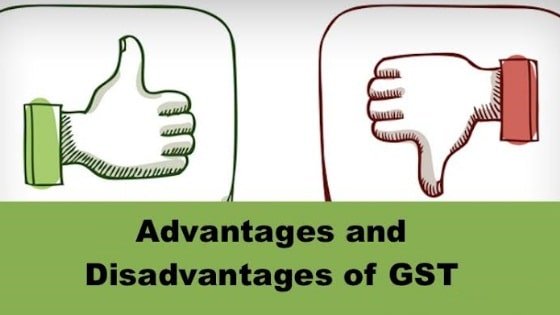GST stands for Goods & Service tax, addresses as one of the improvised taxes which reduce many indirect taxes ( Service Tax, VAT, Excise) enforced by both State & Centre.In a nutshell, only value addition will be levied & the burden of the additional tax will be borne by the final consumer.
Implementation of GST is a big success for the Indian economy. It decreases the scope for additional tax, turnover tax, resale tax, etc. GST is a dual aspect with the Centre and State simultaneously taxing on a common tax base. But GST brings advantages and disadvantages at the same time. In this blog, we will discuss the benefits & drawbacks of GST:
Advantages of Goods and Service Tax

Some of the major benefits of GST are as follow:
1. Abolition of Multiple types of Taxes
The introduction of GST has resulted in the restriction of multiple types of taxes on goods & services. These taxes include Central Excise, Sales Tax, Service Tax, Luxury Tax, Special Additional Duty of Customs, etc. Hence, there are no multiple levies of tax on goods and services.
2. Eliminates the Cascading Effects
GST is a destination-based tax and levied at a single point at the time of consumption of goods and services by the final consumer. It is offered to be charged at all stages from manufacturers to final consumption with credit of taxes paid at primary stage available as set off.Thereby, remove the cascading effect on taxation.
3. Promote Economy efficiency
GST will eventually promote sustainable long term economic growth and economic efficiency, as GST is unbiased to business models, business processes, geographical location and organisational structure. GST has enhanced India’s tax to Gross Domestic Product ratio.This inclusive tax brings consistency and equality among the different working areas. GST creates a common national market and eliminates economic misrepresentation. Hence, increasing voluntary compliance & reducing the compliance cost.
4. Lift Efficiency of Logistics
Logistics cost has been reduced by resolving check-post discrepancies and border taxes after the implementation of GST. As a GST outcome, a 20% price is eliminated in logistics cost for non-bulk goods.
5. Ease of Doing Business at national & International level
The difficulty in indirect tax submission has been decreased with the implementation of GST. In past, almost every company face major issues regarding excise customs, registration of VAT, dealing with tax authorities, etc. GST has gained a competitive edge in the International market for Goods & Services produced in the country due to an increase in exports.
6. Regulation of the Unregulated &Unorganized Sector under GST
Unregulated & Unorganized sectors can be competently regulated with GST. In India, various sectors like construction & textile are extremely unregulated and unorganized. The GST system has become more liable with the establishment of online payments and compliances.
7. Tax Escapes and Block Corruption
Nowadays, the entire tax procedure has become transparent. Today taxes are being paid online; even the facility of filling returns and direct registration has been given to taxpayers. E-transaction and the online system keeps a close watch on fraud & avoidance without interacting with tax authorities. The online modes create a corruption-free tax department which is the key benefit of GST.
Disadvantages of Goods and Service Tax
Various Disadvantages of GST are as follow:
1. Investment in Software Purchase
GST requires special software to be GST Compliant and to continue business operations. Thus, business owners need to bring GST software and acquittal existing accounting software. As result, the cost of software purchase has increased. And the company will also have to spend on teaching people to train people for such software.
2. Tax Burden
Earlier every financial year called only medium and small enterprises to pay excise duty. If the turnover is more than 1.5 crores then only excise duty was levied. But after the arrival of the GST, every enterprise whose turnover is more than 40 lakhs has liable to pay GST under the GST administration.
3. No GST on Fuel Products
The GST is only applicable to Goods and Services across the country. It excludes petroleum products like Diesel, Petrol, etc. The petroleum products come under other taxes like Value Added Tax (VAT), Central Excise Duty. These taxes are levied by states.
4. GST Promote Online Registration and Returns
GST is all about filling GST returns and registration online. This provision is not ideal for small enterprises and companies who are unfamiliar with advanced technologies. It can be quite challenging to accept the GST structure.
Final Words
GST is a common law & procedure throughout the country under a single administration. It is one of the most successful implementations which reduces a group of additional taxes. It is difficult to say whether it has advantages or disadvantages.The advantages or disadvantages of GST depending on the sectors.
Santosh Kumar, the author behind IndiasStuffs.com, is passionate about sharing valuable insights on a variety of topics, including lifestyle, technology, and Indian culture.
Page Contents

